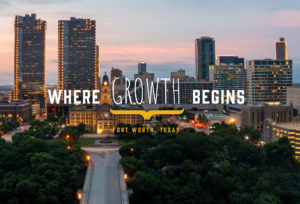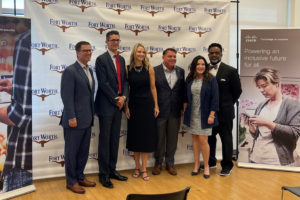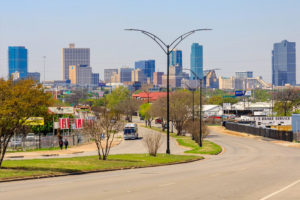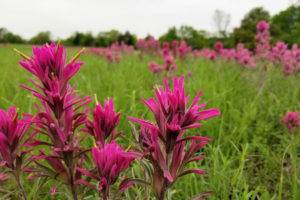Where Growth Begins

Fort Worth is working to attract and cultivate businesses, growth and investment; support a world-class workforce, and drive positive economic impact in our fast-growing city.
With a population of almost 1 million people, Fort Worth is the 13th largest city in the United States, and one of the fastest growing large cities in the nation. But factoring in the growth of the broader North Texas region – which has experienced a 10.3% population growth over the past five years – the business opportunities within this massive influx of companies and skilled talent become even more evident.
It’s also tough to beat Fort Worth’s geographic location, which is easily accessible from every major city within the continental United States in 4 hours or less, thanks to DFW Airport. DFW also serves 70 international destinations, and is the largest carbon neutral airport in the world.
Location is also a key factor in Fort Worth’s logistics strengths – 98% of the United States population can be reached by truck within 48 hours of departing from our city. The global logistics hub around Alliance Airport is the nation’s premier inland port, providing access to international air service, Class 1 rail, and multiple major interstate highways connecting Canada and Mexico.
In summary, by building on the recent update of the City of Fort Worth’s Economic Development Strategic Plan and the region’s diverse economy, Fort Worth is becoming a globally competitive city, while also strengthening the vitality of its many communities and fostering entrepreneurship, innovation and collaboration across all of its business sectors.
Target industries
The following industries already have a strong presence in Fort Worth, and demonstrate significant potential for future growth and investment.
Aerospace & Defense
Fort Worth companies are literally making history, having manufactured machines that have dominated the skies since the 1940s. That legacy continues as local companies like Lockheed Martin, Bell Textron and others continue to build the vehicles of tomorrow, today.
Energy
Fort Worth companies are redefining horsepower. With a history of success in the oil and gas industries, the city is also taking bold steps into the future alongside companies who are pioneering new applications for new kinds of energy and electrification, including Schumacher Electric, Linear Labs, Sinclair Digital and Revitalize Charging Solutions. We’re also working with companies to build in strengths up and down the entire value chain – from research and production to storage, distribution and applications.
Mobility
Companies from around the world are choosing Fort Worth as the place to develop exciting new systems and technologies like Electric Vertical Take-off and Landing (eVTOL) vehicles, Unmanned Aerial System (UAS) delivery systems, autonomous trucks, and more. Many of them are selecting Fort Worth’s Mobility Innovation Zone (MIZ) to commercialize these new technologies. The MIZ is a one-of-a-kind ecosystem where industry leaders in surface and air technology can scale and advance commercialization in an urban environment. Fort Worth is the place where those innovative ideas take flight.
Culture
Whether it’s the city’s burgeoning film industry, its vibrant arts scene and Cultural District, historic attractions, numerous restaurants, or up-and-coming musicians – there’s plenty of opportunities in Fort Worth for creative entrepreneurs.
Anchors & Innovators
While Fort Worth is home to several major companies like American Airlines, the city’s universities and colleges – Texas A&M Law School, TCU, HSC, UTA, and Texas Wesleyan University among them – are also in the midst of major moves to attract and cultivate top talent, create workforce pipelines, and grow the local entrepreneurial ecosystem. This is particularly evident in the fields of healthcare, biotech and life sciences – especially considering that Fort Worth is home to more than 100 health sector businesses and agencies, which include global players in medical research and devices. New frontiers are on the horizon for the city’s newest generations of innovators.
Innovative by design
Fort Worth is thinking outside the box when it comes to managing our booming population growth, ensuring equitable access to resources for all of our neighborhoods, and preparing our critical infrastructure to support the needs of residents for the next decade and beyond. Current and upcoming projects include:
The designation of two new innovation districts
Fort Worth’s new innovation districts are specific geographic areas where companies and anchor institutions can cluster, connect, and cross-pollinate with start-ups, business incubators, accelerators, and producers of marketable intellectual property within an interconnected environment. One of these innovation districts will be focused on mobility and logistics as part of the Fort Worth Mobility Innovation Zone (MIZ), and the other will be focused on medical innovation, in the heart of Fort Worth’s medical district.

the launch of Neighborhood Wi-Fi
City of Fort Worth Neighborhood Wi-Fi program
The City of Fort Worth recently collaborated with technology company Cisco and digital services provider Presidio to launch free Wi-Fi across five – soon to be six – underserved communities in Fort Worth, where lack of home internet access was detrimentally impacting educational opportunities, professional opportunities, and overall quality of life for an estimated 40,000 residents during the COVID-19 pandemic.
• The neighborhoods were selected through information provided through the Neighborhood Improvement Program, which measures data such as household income, poverty, and crime rates so that support services can be concentrated on areas where they’re most needed.
• This first step in the City of Fort Worth’s long-term strategy for fiber optic connectivity citywide provided digital connectivity to 40,000 residents. All five neighborhoods now have restricted broadband coverage of between 55 and 90 percent of residences, and the Wi-Fi initiative will keep residents connected as fiber optic networks are built over the next 5-7 years.
• This project is the largest deployment of Cisco Ultra-Reliable Wireless Backhaul for neighborhood Wi-Fi use in the world. Schools and city facilities such as libraries and community centers – many of which already offered free Wi-Fi – were utilized to amplify and relay the city’s wireless signal to target neighborhoods through radio technology. More than 100 Cisco access points have been installed to date.
• Once deployment is complete, the City of Fort Worth will also prioritize digital literacy for residents, so they understand how to access resources and consume content in a safe, secure way.
• Fort Worth’s larger vision is to have reliable, high-speed internet connectivity available for residents and businesses along with all other utilities as a necessity for modern life.
Learn more about this initiative.
Full-Strength Fort Worth
This revitalization strategy is focused on creating equitable economic vitality across all corners of the city, so that all of its neighborhoods can operate at their highest potential and so the city as a whole can compete at full-strength for businesses and top talent. Launched in 2022, the strategy encourages both public and private investment in 11 key areas of town, and combines the expertise of both local and national partners to create a customized, tailored approach to each community.

state-of-the-art hot corridor
“Hot corridor” along East Lancaster
The City of Fort Worth and other local governmental agencies Texas Department of Transportation (TXDOT), North Texas Council of Governments (COG), and Trinity Metro, are moving forward with the development of a “hot corridor” along East Lancaster Avenue. East Lancaster is an older major thoroughfare that begins in downtown and connects to interstates and multiple communities throughout the Greater Fort Worth area. The project focus will also include several parallel roads and a portion of Interstate 30, which is one of the primary traffic connectors between Fort Worth and other DFW cities.
The hot corridor is currently in its assessment and planning phase, but is expected to include:
• Alternative transit routing options and modes (potentially an articulated bus, street car, etc.), which will be driven by public comment and data-driven analysis.
• A smart city multimodal network that incorporates fiber and Wi-Fi, E/V charging opportunities, and smart traffic signals to monitor and regulate traffic flow and parking.
• Affordable housing and business incubator space that is pedestrian-oriented (complete with walking paths and bike lanes), creates a sense of place, and catalyzes investment in the area, supported by a form-based code.
• Future-proofed design, with the ability to scale up as the area’s population density grows.
• The scope of the project will include near-term, short-term, medium-term and long-term goals and priorities. Construction is expected to begin in early 2026.
Learn more about this new initiative.

prairie spaces preserved as open space
Fort Worth Open Space Conservation Program
This initiative to identify and protect Fort Worth’s most important natural areas combines GIS-based computer mapping and modeling with public input to preserve three key ecosystems across the city – the Fort Worth prairie grasslands, Cross Timbers woodlands, and land around the Trinity River – from encroaching development due to the city’s booming population.
Wide open spaces provide opportunity to grow*
Fort Worth may be growing quickly, but there’s still plenty of opportunity for you and your company to get in on the ground floor.
If you’re looking for office, industrial, retail, or other specific property spaces, our Property Search can help you find what you’re looking for in the central city.
If you’re thinking bigger, you’re in luck – Fort Worth contains more than 165,000 acres (250 square miles) of undeveloped land. This is one of the things that distinguishes Fort Worth from other major cities in Texas – while several of those cities are restricted by their density and are building upward, Fort Worth still offers companies plenty of room to grow.
Nowhere is this reflected more than Fort Worth’s booming industrial market. In 2021, Fort Worth was solely responsible for nearly 3% of the United States’ total industrial growth.
* This list of properties is not comprehensive but reflects an overview of major trends. Property availability fluctuates regularly, and not all opportunities remain available long-term.
Large green field sites located on privately-held ranches, that would be ideal for new development driven by companies within Fort Worth’s target industries.
• Dean Ranch is a 1,825-acre mixed use master-planned development located along the Fort Worth/Aledo border.
• Walsh Ranch is a 7,200-acre development that’s one of the largest of its kind in a major U.S. city. The first 1,700 acres are currently in development, covering commercial opportunities, residential neighborhoods, mixed-use areas, and much more.
• Veale Ranch contains 3,790 acres of land across Tarrant and Parker counties, and is located 11 miles west of downtown Fort Worth. It will also include 1,000 acres of prime commercial property.
• Chisholm Trail Ranch contains 263 acres of commercial and industrial property.
• Rock Creek Ranch contains 1,765 acres of commercial and residential property.
Another opportunity in Fort Worth that’s coming online now is Panther Island. A major flood mitigation project connecting the ends of a U-shaped bend in the Trinity River is currently underway in Downtown Fort Worth. Once complete, that channel will result in two “islands” totaling 340 acres in size, which effectively expands the footprint of downtown by 40%. This property will include several miles of active urban waterfront, creating some exciting new real estate opportunities perfect for large developments or a corporate campus within the heart of the central city. Flood mitigation work is still ongoing, but more information about the project can be found online.
Select industrial locations, perfect for higher-value industries, spec buildings, data centers and e-commerce sites.
• AllianceTexas is a 27,000-acre master-planned industrial, mixed-use and residential community developed by Hillwood, and is home to a world-class intermodal logistics hub and Fort Worth’s Mobility Innovation Zone (MIZ). Since its inception, AllianceTexas has generated over $100 billion in regional economic impact with more than 500 companies, all of which is anchored by Perot Field Fort Worth Alliance Airport – the world’s first industrial airport, now ranked 20th in U.S. cargo operations.
• Northpoint is a Class A industrial development that offers direct access to BNSF Railway’s intermodal facility at Alliance.
• Other available properties may be available through:
Infill industrial opportunities and redevelopment of existing areas, buildings and brownfields.
• 820 Industrial Park is a five-building 75,586 square foot industrial park situated on 4.71 acres, with easy access to the Loop 820 frontage road.
• Fort Worth & Western Railroad (FWWR) offers a variety of properties near the interstate, all of which receive rail service from FWWR.
• Sylvania Industrial Park is served by both rail and crane, with immediate access to I-35 and over 893,000 square feet of manufacturing storage space.
It takes an ecosystem
In Fort Worth, economic success is a team sport. Our city has a variety of different economic development partnerships in both the public and private sectors, several of which are listed below.
- City of Fort Worth Economic Development Department
- Fort Worth Chamber of Commerce
- Fort Worth Hispanic Chamber of Commerce
- Fort Worth Metropolitan Black Chamber of Commerce
- Visit Fort Worth